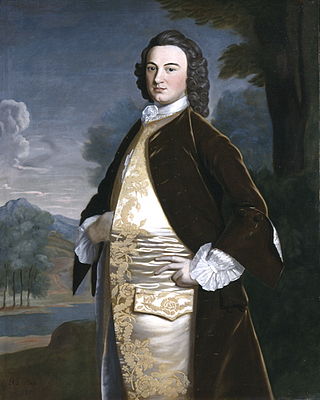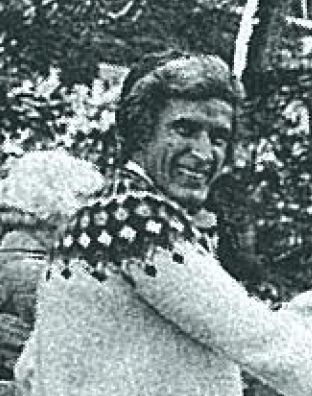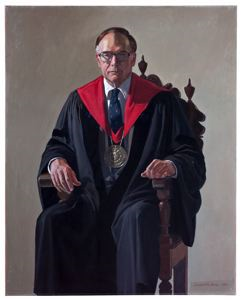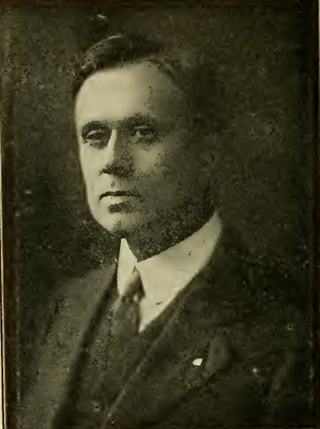Kent John Chabotar (born October 7, 1946) is an American political scientist and academic administrator. He was a professor of political science and president of Guilford College from 2002 to 2014. [1]
Kent John Chabotar (born October 7, 1946) is an American political scientist and academic administrator. He was a professor of political science and president of Guilford College from 2002 to 2014. [1]
Chabotar was born in New York City. He graduated magna cum laude from Saint Francis University in Loretto, Pa., in 1968 with a bachelor of arts degree in political science. He served two terms as student government president. He earned a master of public administration degree with distinction and doctor of philosophy degree in public administration from the Maxwell School of Citizenship and Public Affairs of Syracuse University in 1969 and 1973, respectively.
Chabotar went on to Michigan State University where he was an assistant professor of political science from 1972-75. There he received the school's Distinguished Educator Award for teaching excellence in 1973. The next year he was honored by the Michigan Legislature for his development of public administration programs. In 1975, Chabotar was a charter faculty member for the College of Professional Studies at the University of Massachusetts Boston.
In the 1980s, Chabotar became a lecturer and faculty member at Harvard University's the Graduate School of Education, eventually receiving the school's Fussa Distinguished Teaching Award in 1988. From 1984–86, he served as chief financial officer for The Williamson Group of Cambridge, Mass., a start-up computer services company. Additionally, he was vice president and treasurer at Education Development Center, Inc., of Newton, Mass., a worldwide nonprofit educational research firm from 1986-89.
Chabotar later served as vice president for finance and administration and treasurer at Bowdoin College in Brunswick, Maine from 1991-02 where he was subsequently honored by the Maine Legislature on the 25th anniversary of his college teaching. Bowdoin students established the Kent John Chabotar Scholarship Fund in 2002. He received the Distinguished Alumnus Award in Education from St. Francis University in 2003, and the Academic Leadership Award from the Council of Independent Colleges in 2003.
Chabotar is a member of the commission on Southern Association of Colleges and Schools and a member of the board of directors for the Council of Independent Colleges. He has authored or co-authored books, as well as numerous journal articles and monographs.

Bowdoin College is a private liberal arts college in Brunswick, Maine. When Bowdoin was chartered in 1794, Maine was still a part of the Commonwealth of Massachusetts. The college offers 35 majors and 40 minors, as well as several joint engineering programs with Columbia, Caltech, Dartmouth College, and the University of Maine.

James Bowdoin II was an American political and intellectual leader from Boston, Massachusetts, during the American Revolution and the following decade. He initially gained fame and influence as a wealthy merchant. He served in both branches of the Massachusetts General Court from the 1750s to the 1770s. Although he was initially supportive of the royal governors, he opposed British colonial policy and eventually became an influential advocate of independence. He authored a highly political report on the 1770 Boston Massacre that has been described by historian Francis Walett as one of the most influential pieces of writing that shaped public opinion in the colonies.

John Patrick "Pat" Crecine was an American educator and economist who served as President of Georgia Tech, Dean at Carnegie Mellon University, business executive, and professor. After receiving his early education at public schools in Lansing, Michigan, he earned a bachelor's degree in industrial management, and master's and doctoral degrees in industrial administration from the Graduate School of Industrial Administration at Carnegie Mellon University. He also spent a year at the Stanford University School of Business.

Kents Hill School is a co-educational, independent college-preparatory school for boarding and day students. Kents Hill is located in Kents Hill, Maine, 12 miles west of the state capital of Augusta. It is the 30th oldest boarding school in the United States and one of the oldest continuously operating co-educational college preparatory schools. One of the three oldest Methodist academies in the United States, the school is now a member of the Association of Independent Schools in New England (AISNE) and accredited by the New England Association of Schools and Colleges (NEASC).
The history of Michigan State University dates back to 1855, when the Michigan Legislature established the Agricultural College of the State of Michigan under the encouragement of the Michigan State Agricultural Society and the Michigan Farmer, the state's leading agricultural periodical. As the first agricultural college in the United States, the school served as a model for other institutions of its kind established in the period, to give an instance, the Agricultural College of Pennsylvania.

Lane Hall is a later 20th-century neoclassical building serving as the principal workplace and headquarters of the central administration of Bates College, located at 2 Andrews Road in Lewiston, Maine. It has been the principle administrative headquarters of every Bates president since Thomas Hedley Reynolds in 1964. Lane Hall was named after George Lane Jr., who served as treasurer of the college and secretary of the corporation.

Ralph Wendell Conant (1926-2017) was a writer and researcher in the areas of social policy, metropolitan governance, and regional planning. Conant is also the former president of Shimer College and Unity College.

James H. Ammons is an American educator, who is the Chancellor of Southern University at New Orleans. He served as president of Florida A&M University (FAMU) from July 2, 2007, until his resignation took effect on July 16, 2012. He is a native Floridian who grew up in the heart of Florida's citrus belt. He graduated from Winter Haven High School in 1970 and entered Florida A&M University on the Thirteen College Curriculum Program during the fall semester of 1970. Ammons was appointed Chancellor at Southern University in New Orleans January 8, 2021.

Charles Wilbert "Bill" Snow was an American poet, educator and politician. He served as the 75th Governor of Connecticut. He generally went by the name Wilbert or Bill Snow, or formally as C. Wilbert Snow.

The National Association of Scholars (NAS) is an American 501(c)(3) non-profit politically conservative education advocacy organization. It advocates against multiculturalism, diversity policies, and against courses focused on race and gender issues.

Arthur LeRoy Greason, Jr. was the twelfth president of Bowdoin College in Brunswick, Maine, serving from 1981 to 1990.

Harry Thomas Edwards is an American jurist. He served as a United States circuit judge of the United States Court of Appeals for the District of Columbia Circuit from 1980 to 2005, taking senior status in 2005, and a professor of law at the New York University School of Law.

John Carpenter Hull served the state of Massachusetts for twenty years between 1916 and 1936 at the Statehouse in Boston chairing the committees of Education, Judiciary, Elections and Public Institutions. He was also the Speaker of the House of Massachusetts from 1925 to 1928, educator, lawyer, and the first Securities Director of Massachusetts.
Seth Allan Berry is an American business, education and policy leader from the state of Maine. Berry ran 7 times from 2006 to 2020 for a seat in the Maine House of Representatives and was elected each time, representing Bowdoin, Bowdoinham, Richmond, and Swan Island, an historic wildlife preserve in the Kennebec River. In the Legislature, Berry was elected by his peers to serve as Majority Whip and later as Majority Leader, and served as chair of the committee on Energy, Utilities and Technology, chair of the Joint Select Committee on Maine's Workforce and Economic Future (2015-2016), and as lead Democrat on the committee overseeing tax policy.

John C. Rensenbrink was an American political scientist, philosopher, journalist, conservationist, and political activist. He initiated many organizations, the most prominent of which are the Maine Green Party (1984); the Green Party of the United States (1984–87) for both of which he was a principal founder; and the Cathance River Education Alliance (2000), a hands-on ecological education project for local schools, schoolchildren and high school students in mid-coast Maine.

F. Chris Garcia is an educator, scholar, researcher, author, public opinion pollster and higher education administrator. From 2002-2003, he served as the president of University of New Mexico. Garcia was the first native New Mexican Hispanic to serve as a college dean, academic vice-president and president at the University of New Mexico.

The history of Bates College began shortly before Bates College's founding on March 16, 1855, in Lewiston, Maine. The college was founded by Oren Burbank Cheney and Benjamin Bates. Originating as a Free Will Baptist institution, it has since secularized and established a liberal arts curriculum. After the mysterious 1853 burning of Parsonsfield Seminary, Cheney wanted to create another seminary in a more central part of Maine: Lewiston, a then-booming industrial economy. He met with religious and political leaders in Topsham, to discuss the formation of such a school, recruiting much of the college's first trustees, most notably Ebenezer Knowlton. After a well-received speech by Cheney, the group successfully petitioned the Maine State Legislature to establish the Maine State Seminary. At its founding it was the first coeducational college in New England. Soon after it was established, donors stepped forward to finance the seminary, developing the school in an affluent residential district of Lewiston. The college struggled to finance its operations after the financial crisis of 1857, requiring extra capital to remain afloat. Cheney's political activities attracted Benjamin Bates, who was interested in fostering his business interests in Maine. Bates donated installments of tens of thousands of dollars to the college to bring it out of the crisis.

Robert Devore Leigh was an American educator, political scientist, and leader in the field of library science. He was the founding president of Bennington College, and served there from 1928-1941. He made the college a center of progressive education, designing a curriculum with no rigid requirements, intensive instruction, off-campus study, and an emphasis on the arts. He attracted a faculty that included distinguished writers, artists, and dancers.